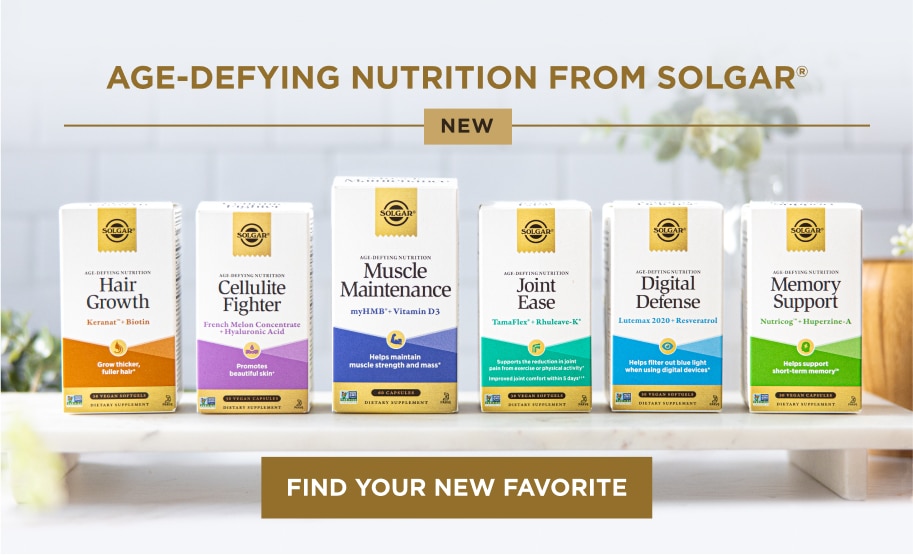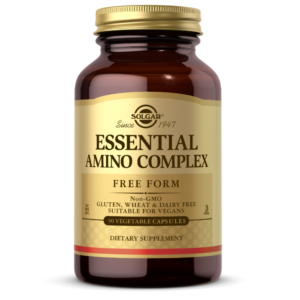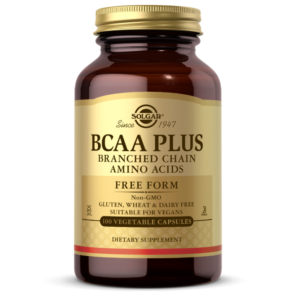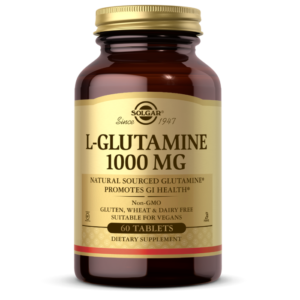Key Takeaways:
- Amino acids are organic compounds that make up protein. There are three types of amino acids: essential, nonessential, and conditional.
- Supplementing BCAAs, whey protein, essential amino acids, L-glutamine, or 5-HTP can help support muscle growth and other fitness goals.
If you’re interested in fitness or exercise, you probably know the importance of protein for building muscle. But did you know that amino acids — often referred to as the building blocks of protein — are equally important?
What are amino acids?
Amino acids are organic compounds that come together to create proteins. Both plant and animal proteins are made up of about 20 amino acids, and all food proteins (other than gelatin) contain some of each.1 When you eat protein, your body breaks the protein down into amino acids.
There are three main types of amino acids: essential, nonessential, and conditional. Essential amino acids cannot be made by the body and must come from food. The nine essential amino acids are histidine, isoleucine, leucine, lysine, methionine, phenylalanine, threonine, tryptophan, and valine.
Nonessential amino acids are those that the body can produce on its own. Nonessential amino acids include alanine, arginine, asparagine, aspartic acid, cysteine, glutamic acid, glutamine, glycine, proline, serine, and tyrosine.
Finally, conditional amino acids are produced only under specific circumstances, such as in times of stress or illness. Conditional amino acids include: arginine, cysteine, glutamine, tyrosine, glycine, ornithine, proline, and serine.2
What do amino acids do?
Because amino acids play such a foundational role, they are involved in many chemical processes that help maintain your body’s normal functions. Amino acids are involved in almost every system throughout the body, including:
- Assisting in the creation and growth of muscles, connective tissue, and skin.*
- Helping maintain muscle tone and tissue strength.*
- Provide the crucial building blocks for protein.*
- Help support protein metabolism in muscle tissue.*
- Maintaining healthy hair, skin, and nails.*
- Necessary for health and wellness.*
- & much more.
Sources of amino acids
Although your body can produce some amino acids on its own, others — specifically, essential amino acids — must come from food or supplements.
The best sources of essential amino acids are animal proteins such as meat, dairy, eggs, and poultry. These foods are considered to be “complete proteins” because they contain all nine essential amino acids.
Because most plant-based sources of proteins are missing at least one amino acid, they are considered “incomplete proteins.” For this reason, it is suggested that vegetarians and vegans combine plant-based foods, such as beans and rice, or eat a variety of plant-based foods that supply a good amount of protein including nuts, seeds, and legumes. One exception is quinoa, which is a great, vegan-friendly source of all nine essential amino acids.
Essential amino acid supplement:
Solgar® Essential Amino Complex Vegetable Capsules
Taking a supplement is a great way to ensure you are getting essential amino acids daily. Solgar® Essential Amino Complex includes eight essential amino acids per serving and is vegan, non-GMO, gluten-free, dairy-free, and kosher.
Can supplementing amino acids support your fitness goals?
If you eat a balanced diet, chances are that you are getting enough amino acids. However, supplements of protein and amino acids are often recommended to those looking to support their fitness and athletic performance.
BCAAs
Amino acids allow protein to help rebuild and repair skeletal muscle and connective tissue.* While all essential amino acids are important for this function, three of them play a primary role: leucine, isoleucine, and valine. These three amino acids are also known as branched-chain amino acids or BCAAs.
BCAAs are well-loved by athletes or fitness enthusiasts for their ability to aid muscle growth.* The BCAA leucine is well-known for its role in activating a pathway in the body that stimulates muscle protein synthesis, which is the process of making muscle.*3 4
Supplementation with BCAAs helps support muscle nitrogen and can also be used for energy by muscle tissue.* BCAAs also make up a large percentage of the amino acids that exist in muscle.*5 6 7 8 9
BCAA supplement:
Solgar® BCAA Plus Vegetable Capsules
Solgar® BCAA Plus provides free form L-leucine, L-isoleucine, and L-valine — as well as vitamin B6. Each serving is formulated for optimal absorption and assimilation and is vegan, non-GMO, gluten-free, dairy-free, and kosher!
Whey Protein
Not all proteins are created equal. Some forms of protein, such as whey protein, are considered to be of higher quality as compared to others. The reason is because whey protein contains all the essential amino acids and a higher concentration of BCAAs needed to build muscle compared to other proteins.*
Whey protein is a mixture of proteins isolated from whey, which is the liquid part of milk that separates during cheese production. Taking a protein supplement can help support muscle repair and growth.10
Whey protein supplement:
Solgar® Grass Fed Whey to Go Protein Powder
Solgar® Grass Fed Whey to Go Protein offers 20 grams of grass-fed protein from pasture-raised cows in New Zealand. Using protein from grass-fed cows, Solgar® supports the local dairy farms in New Zealand and supports sustainable livelihoods for farmers while allowing cows to verify quality animal care.
Solgar® Grass Fed Whey to Go Protein is non-GMO, gluten-free, soy-free, and RBGH free. Available in unflavored or chocolate-flavored options.
Other amino acid supplements:
5-HTP
5-Hydroxytryptophan, or more commonly 5-HTP, is an amino acid that is naturally produced by the body. The body uses 5-HTP to produce serotonin, which is an important neurotransmitter that contributes to a positive mood or feelings of wellbeing.*
Solgar® 5-HTP Vegetable Capsules
Solgar® 5-HTP acts as a precursor to serotonin and helps to promote a calm and relaxed mood.* And, it’s vegan, non-GMO, gluten-free, dairy-free, kosher, and halal!
L-Glutamine
Glutamine is the most abundant amino acid in the body. Like many other amino acids, glutamine exists in two forms: L-glutamine and D-glutamine. L-glutamine can become a conditionally essential amino acid because it’s involved in more metabolic processes than any other amino acid.* While the body can make L-glutamine, more may be needed in times of occasional metabolic stress such as during serious training or exercise.* It can also serve as a fuel source for immune, intestinal, and brain cells.*
L-Glutamine regulates nitrogen transport to and from muscle tissue, thereby promoting amino acid balance.* This formulation provides free-form L-glutamine to promote optimal absorption and assimilation.* And, it’s vegan, non-GMO, gluten-free, dairy-free, and kosher!
GET THE LATEST UPDATES AND EXCLUSIVE DEALS WHEN YOU SIGN UP FOR OUR NEWSLETTER!
All about amino acids
As the building blocks of protein, amino acids are involved in a wide variety of bodily functions, including muscle growth.* While essential amino acids are readily available in a balanced diet, supplementing BCAAs, whey protein, glutamine, or 5-HTP can help you take your fitness to the next level.
To learn more about Solgar® supplements and all things health and wellness, follow us on Instagram!
*These statements have not been evaluated by the Food and Drug Administration. These products are not intended to diagnose, treat, cure or prevent any disease.
The information provided on this site is intended for your general knowledge only and is not a substitute for professional medical advice or treatment for specific medical conditions. Always seek the advice of your physician or other qualified healthcare provider with any questions you may have regarding a medical condition. The information on this website is not intended to diagnose, treat, cure or prevent any disease. Never disregard medical advice or delay in seeking it because of something you have read on the Solgar® site.





